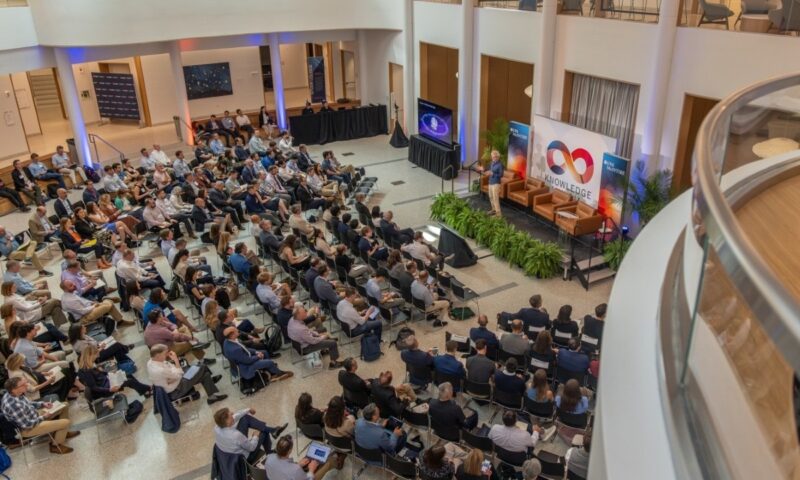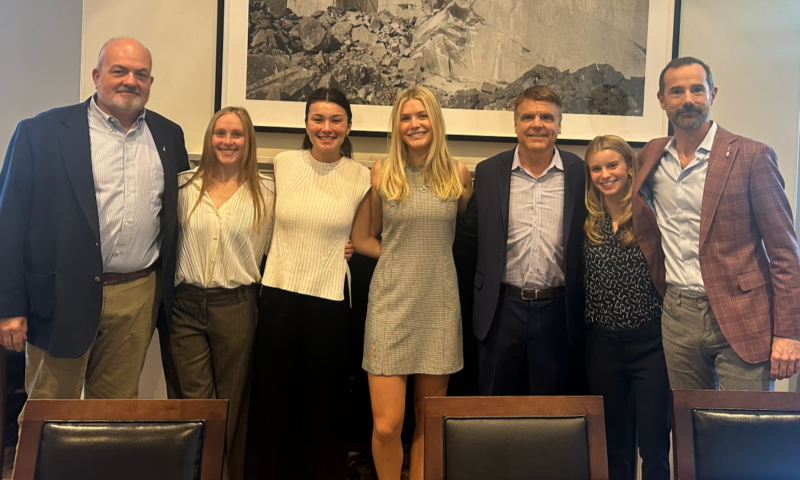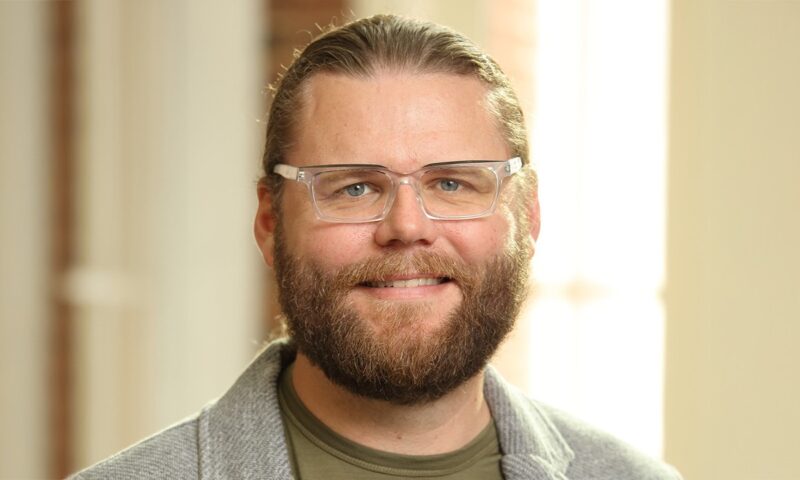
Ted Lichtenberger, Amanda Payne, and Caelan Urquhart
Discovering solutions. Imagining new businesses. Transforming organizations. Advancing social good and real-world value. For more than a decade, specific efforts focused on innovation and entrepreneurship at the Commerce School have been driving change in a multitude of ways, involving countless students, faculty, and alumni throughout the University, and, indeed, the world.
McIntire is the administrative host to the multi-school Entrepreneurship Minor, a highly eclectic program fostering many rich collaborations that are often the start of long-ranging initiatives developed to extend far beyond both Grounds and the time allotted in a particular semester. And as the minor persists as an attractive and immersive learning experience, its growing success as an engine of positive impact is a prime example of entrepreneurial activity at the Commerce School.
The results of the various endeavors and solutions being tried, tested, and implemented from within McIntire have been as diverse as the ways in which the subjects of innovation and entrepreneurship have been purposefully engaged to solve problems and create opportunities.
The Start of Something New
McIntire Professor Eric Martin says that many students from the College of Arts & Sciences are drawn to the 15-credit program in order to connect it to their major, but that he has seen a steady increase in McIntire enrollment in recent years. A result of exposure to that unique education has led some B.S. in Commerce graduates to assume a role in innovation within a traditional firm, while others have completely shifted career plans by following their first few years of professional experience with a return to entrepreneurship, launching ideas wholly different from their initial trajectory’s main business focus.
“Our goal in the minor is not only to turn people into founders,” Martin says. “Students develop a new way of thinking about the world that can be applied in any space, nonprofit and for-profit. It’s really about having an innovative mindset. We have a lot of students who take that outlook and skill and deploy it in sometimes unexpected ways. The flavors of what students in Entrepreneurship become is quite broad.”
Some students get their ideas off the ground while still on Grounds, such as Kenyon Kay (McIntire ’22) and Matisse Schafer (McIntire ’22), who created breakfast food truck The Yolk Shack while taking the minor. Still others have cultivated the intended mindset of the program and used it elsewhere to manage undertakings later on—and in seemingly unlimited applications.
Past participants include Amanda Payne (A&S ’18), who took the Social Entrepreneurship concentration of the minor while earning her degree in Global Development Studies, and who has been leading teams as an Innovation Associate with leading global innovation consultancy Fahrenheit 212.
“I always thought I wanted to be an entrepreneur: identifying pressing needs, building businesses to serve them, and on to the next. But it wasn’t until I began this program that I started to actually understand what this meant in action,” says Payne. “The social aspect of the program helped inspire me to want to take my education and go out into the world and build businesses for change.”
She says her future began to coalesce when Martin introduced a Fahrenheit 212 Partner to speak to one of her classes during the spring of her fourth year; their mission and motto (“Make things better, make better things”) resonated with her. “I have been with Fahrenheit 212 for two years now, and it is a career I cherish. I only discovered it as a result of the Social Entrepreneurship program and the incredible professors who helped shape my passions.”
Others, such as McIntire alumni Caelan Urquhart (McIntire ’13) and Ted Lichtenberger (McIntire ‘13), launched eyewear technology company Frameri in their final semester at the Comm School, before taking on roles as Analysts. They then returned to see their entrepreneurial urges through, pivoting to new ventures: Urquhart recently launched data engineering firm Pipekit, and Lichtenberger co-founded Old Pal, the largest cannabis flower brand in California and Nevada, as well as Y Combinator-backed cannabis e-commerce business FLOWER CO.
Urquhart believes that his time pursuing the minor—and the experiences that derived from it—were crucial and remain instructive in his work today.
“Frameri’s failure has served us incredibly well in how we both approach leading startup teams. We realized that failure was temporary,” he says, living proof of the real-world bearing of what he learned. “The beauty of the Entrepreneurship classes I took was that there were no hackable tests at the end of the semester. Every day is a test of your product, of your market, of your discipline, and of your resolve that you learn to embrace through highs and lows. I found this process was much more challenging and fulfilling than the other ‘tests’ I had been taking until then: getting good grades, taking on a long list of extracurricular activities, and getting a job offer.”
Courses of Action
Those Entrepreneurship classes Urquhart refers to form a lengthy list of electives from which students are spoiled for choice, with courses spanning a very wide selection of subject matter probing topical specialties. Courses investigate areas as varied as chemistry, medicine, and global humanitarian crises responses as well as social psychology, impact investing, arts administration, and more.
Martin says that while the courses offer different access paths to learning innovative thinking, there are some notable examples of classes that have perennially yielded high-impact learning.
Important first impressions are made with students in courses like Intro to Social Entrepreneurship taught by Batten School Professor Bala Mulloth. Commerce Professors Chip Ransler and Bevin Etienne’s Startup: An Introduction to Entrepreneurship teaches foundational principles, approaches to problem solving, and immersive simulations of ventures. Engineering Professor Rob Archer’s New Product Development stands out for delving deep into structural, organizational, financial, aspects of commercializing products.
Other courses frame entrepreneurship as an avenue for driving change and bringing value to specific parts of the globe.
Batten School Professor Christine Mahoney’s Impact Investing in Appalachia takes students directly to where opportunities for social and environmental advancement are taking place in Virginia, West Virginia, and Kentucky. Students meet Appalachian investors and project founders to examine subjects such as environmental conservation and renewable energy and their effect on local communities.
Etienne’s Social Entrepreneurship in Small Island States focuses on Caribbean island nation Dominica and the challenges entrepreneurs face, highlighting the crucial need for social ventures to advance sustainable growth and development. The multidisciplinary experience mixes site visits to enterprises including organic farms, ocean fishing cooperatives, local manufacturing facilities, sustainable tourism, and cargo transportation, with guest lectures by Dominican social entrepreneurs and government officials.
Martin’s own Innovation in Business capstone class, the first course from which the minor’s McIntire-based Innovation in Business concentration has grown and which he has taught for more than a decade, leads student teams toward formalizing and commercializing business concepts. Judging by the number of alumni and current students who engage in such efforts, like the group that formed a consultancy to help local businesses during the pandemic, those concepts taught in the class really are taken to heart.
And Much, Much More
It has to be said that the above examples are only a small sampling of this kind of activity to flow through McIntire.
The Commerce School’s Galant Center for Innovation and Entrepreneurship—a nexus of venture-related initiatives within the School and for which Martin serves as Director—provides extracurricular training opportunities to students and alumni, while supporting off-Grounds nonprofits such as Forge (formerly HackCville) that have prepared thousands of students to create impact. The Center also supports faculty research and related studies in subjects such as donation methodologies encouraging intentional giving and energy system modeling of extreme weather events in Puerto Rico.
The Center has made a name for itself for its role in pitch competitions like its namesake, Galant Challenge, which draws great interest from those vying for seed funding across Grounds and Virginia. Martin contends that it has potential in the future for becoming a significant nationwide competition that stands to be one of the largest in the country.
The pandemic may have temporarily slowed down many programs, but it hasn’t put a stop to innovation and entrepreneurship at the Comm School. And though online interactions have had to stand in for some experiences, the future still holds immense promise and excitement to come, with a return to real-world business implementation, engaging in-person events, and essential on-site interactions that will continue to usher in McIntire’s next wave of creators of value and solvers of problems.


